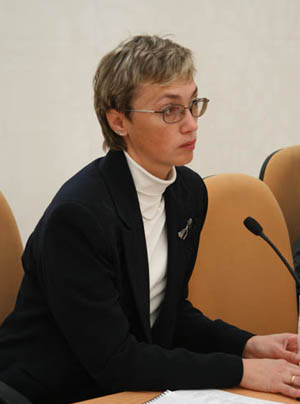Interview
In the run-up to the 69th anniversary of the Great Victory, we interviewed Olga Malinova, PhD, Professor of Comparative Political Science at MGIMO-University about the place of the Great Patriotic War in the historical memory of generations.
In the run-up to the 69th anniversary of the Great Victory, we interviewed Olga Malinova, PhD, Professor of Comparative Political Science at MGIMO-University about the place of the Great Patriotic War in the historical memory of generations.
What place does Russia’s victory in the Great Patriotic War hold in the historical memory of the older and young generations of the new, post-Soviet Russia?
Russia’s victory in the Great Patriotic War is the most significant vestige of our past that can be leveraged for political purposes. Modern Russia has inherited a very rich ‘arsenal’ of the thousand-year history of the Romanov Empire and the USSR. For a number of reasons, this arsenal can be used in politics. Best suited for this are high-profile events filled with symbolic meaning and of great importance to the public. To be usable, these events need to be recognizable. Moreover, they must not be controversial, events that might divide society into those who view it as absolutely positive and those who consider it ultimately negative, thus achieving zero overall response. These events must be reflected in rites and practices played out annually. In this sense, the state institutionalizes these events through annual holidays tied to symbolic practices and rites. They are considered a useful symbolic resource.
It is very important that these past episodes present us as a society in a positive way. The positive nature of an event is always defined by cultural conventions and practices. An image of a nation can only be positive after a certain canon. If we look at the repertoire of our historic events, we will see that victory in the Great Patriotic War is a rare episode of the nation’s past which satisfied all the criteria of an effective political leverage. This is probably why it is often exploited for political purposes, both by the state and by the opposition.
For Russians, the memory of the Great Patriotic War is sacred and incontrovertible. Yet, as generations come and go, the share of the population that can relate to the War and see it as part of their own lives decreases. Very soon, we could find ourselves living in a society, the overwhelming majority of which (if not everyone) received their information on this major event from very diverse sources. The memory of the Great Patriotic War is, in fact, institutionalized very well in Russia: we learn about it from history books, conversations with witnesses and participants of the event, fiction, etc.
Currently, Russian society is going through an intergenerational transformation. When this process is completed, the majority of society will learn about the Great Patriotic War from secondary and tertiary sources. Another important aspect is that the legacy of the War has been politically leveraged for the entire 70 years after the victory, yet it has been used in various ways. The political aims and contexts have changed. Victory Day has always been celebrated, but in a different way in each era. Historically, the war memory cult came to its prime during Brezhnev’s years in power, and post-Soviet Russia inherited the practices and format of Victory Day celebrations from that late Soviet period.
As far as the political elites are concerned, it must be noted that, in the early 1990s, several clear attempts were made to adjust the legacy of the War to the current political context. It was reflected in a rather radical change of celebration practices and the accompanying discourse. Yeltsin’s political elite tried to stress that it was the victory of the people and not the Soviet state, achieved in spite of the regime rather than by it. Victory Day ceremonies were held away from Red Square in different places, notably on the territory of the newly constructed memorial complex on Poklonnaya Gora. In 1995, the 50th anniversary of the Victory in the Great Patriotic War was once again held on Red Square. Victory Day parades have been held there every year since then. Even back in Soviet times, the May 9 parade was only held in anniversary years (that is, every five years). In part, the annual celebrations were introduced to maintain the historical memory of the Great Patriotic War, which plays a very important part for constructing a new national identity for Russians. Yet its delivery format has been visibly changing – like I said, due to the fact that the generation of War veterans is gradually passing, giving way to a new generation that did not experience that War and, therefore, needs to be conditioned for the event through appropriate political and symbolic practices.
There is, unfortunately, one more problem. The Great Patriotic War, as a symbolic resource of unique importance, has been over-exploited. The memory of the War is used in different ways, with various political goals in mind, which leads to the so-called inflation of symbols: an event overused and interpreted too diversely can gradually loose it symbolic value. This is exactly what is happening in Russia.
The state and political groups are sure to continue investing heavily in maintaining the memory of the War. The memories of different generations, however, will imminently differ. Yet it is safe to say that Russia will do everything to pass on the memory of the Great Patriotic War to the new generations.




